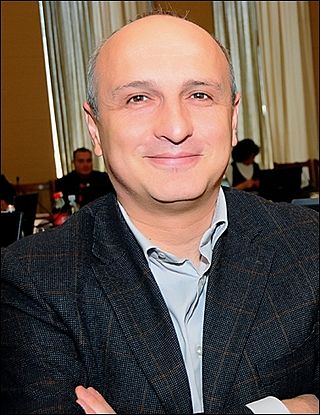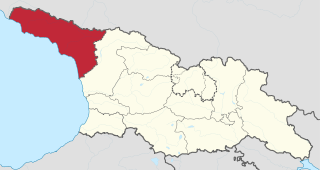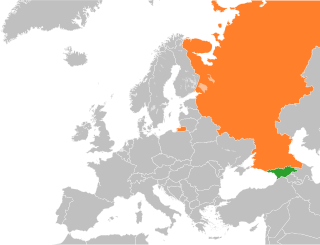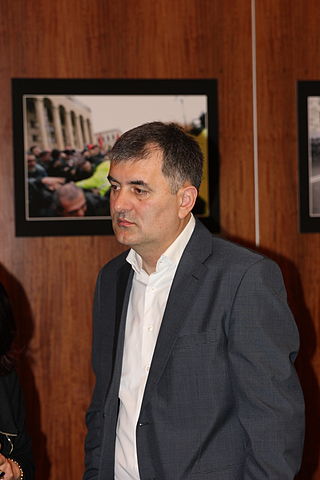Contents
- Incumbents
- Events
- January
- February
- March
- April
- May
- June
- July
- August
- September
- October
- November
- Deaths
- See also
| |||||
| Decades: | |||||
|---|---|---|---|---|---|
| See also: | Other events of 2006 List of years in Georgia (country) | ||||
| |||||
| Decades: | |||||
|---|---|---|---|---|---|
| See also: | Other events of 2006 List of years in Georgia (country) | ||||

The Abkhazia conflict is a territorial dispute over Abkhazia, a region on the eastern coast of the Black Sea in the South Caucasus, at the intersection of Eastern Europe and Western Asia. The conflict involves Georgia, the Russian Federation and the Russian-backed self-proclaimed Republic of Abkhazia, which is internationally recognised only by Russia, Venezuela, Nicaragua, Nauru, and Syria; Georgia and all other United Nations members consider Abkhazia a sovereign territory of Georgia. However, as of 2023, Georgia lacks de facto control over the territory.

Irakli Okruashvili is a Georgian politician who had served on various important posts in the Government of Georgia under President Mikheil Saakashvili, including being the Minister of Defense from December 2004 until being dismissed in November 2006.

Ivane "Vano" Merabishvili is a Georgian politician and 9th Prime Minister of Georgia from 4 July to 25 October 2012. A former NGO activist, he became directly involved in Georgia's politics in 1999 and emerged as one of the government's most influential members after the 2003 Rose Revolution, especially as Georgia's Minister of Internal Affairs.

The Georgian–Ossetian conflict is an ethno-political conflict over Georgia's former autonomous region of South Ossetia, which evolved in 1989 and developed into a war. Despite a declared ceasefire and numerous peace efforts, the conflict remained unresolved. In August 2008, military tensions and clashes between Georgia and South Ossetian separatists erupted into the Russo-Georgian War. Since then, South Ossetia has been under a de-facto Russian control.

The Government of the Autonomous Republic of Abkhazia is an administration established by Georgia as the legal and only government of Abkhazia. Abkhazia has been de facto independent from Georgia – though with limited international recognition – since the early 1990s. Ruslan Abashidze, elected in May 2019, is the current head of the government-in-exile.
The Sandro Girgvliani murder case is one of the most notorious criminal cases in the modern history of Georgia. The killing, and the events that followed, generated heavy criticism of the former government, particularly the interior minister, and debate about the extent to which then President Mikheil Saakashvili had truly introduced judicial independence and a democratic culture into Georgian society.
The 2006 Georgian–Russian espionage controversy began when the Government of Georgia arrested four Russian officers on charges of espionage, on September 27, 2006. The Western and Georgian media sources report that relations between the two post-Soviet nations have significantly deteriorated after Georgia and NATO agreed to hold talks on closer relations.

Contacts between Russia and Georgia date back to the 15th and 16th centuries, and the most important stage started in the 1580s, when the Georgian kingdom of Kakheti and the Russian Empire signed a treaty of alliance in 1587. Relations between the two countries developed vibrantly and culminated in the Treaty of Georgievsk, which established eastern Georgia as a protectorate of Russia. At that time, Georgia saw Russia as a powerful Christian and modernizing neighbor, capable of protecting Georgia from invading Muslim empires and North Caucasian raiders.

Sozar Subari is a Georgian politician, journalist, and former human rights activist. He was formerly Georgia's Minister for IDPs, Accommodation and Refugees from 26 July 2014 to 13 June 2018. He served as a Public Defender (Ombudsman) of Georgia from 2004 to 2009 and Minister of Corrections and Legal Assistance from 2012 to 2014.
The 2007 Georgia missile incident refers to the landing of a missile in the Georgian village of Tsitelubani in the Gori district near the Georgian-Ossetian conflict zone, some 65 km (40 mi) north-west of Tbilisi, the capital of Georgia, on 7 August 2007. Georgian officials said that two Russian combat aircraft violated its airspace and fired a missile, which fell on the edge of a village but did not explode. Russia denied this allegation and said that Georgia may have fired the missile on its own territory as a way of provoking tensions in the region. Several expert teams were sent to Georgia to investigate the incident. While two international investigation teams confirmed Georgia's claims, the Russian team dismissed them. The Organization for Security and Co-operation in Europe (OSCE) stated that it was "extremely difficult to have a clear picture", given the conflicting nature of the experts' findings. The organization decided not to launch its own probe into the incident. The Portuguese ambassador to the OSCE has issued a statement on behalf of the EU, which refrained from supporting either Georgian or Russian version of the events.

In 2007, a series of anti-government protests took place across Georgia. The demonstrations peaked on 2 November 2007, when 40,000–50,000 rallied in downtown Tbilisi, the capital of Georgia. People protested against the allegedly corrupt government of president Mikheil Saakashvili. Protests triggered by detention of Georgian politician Irakli Okruashvili on charges of extortion, money laundering, and abuse of office during his tenure as defense minister of the country were organized by the National Council, an ad hoc coalition of ten opposition parties, and financed by the media tycoon Badri Patarkatsishvili. Demonstrations occurred both in September and November 2007 and were initially largely peaceful. The protests went downhill by 6 November 2007, but turned violent the next day when the police, using heavy-handed tactics, including tear gas and water cannon, unblocked Rustaveli Avenue, Tbilisi's main boulevard, dislodged the protesters from the territory adjoining to the House of Parliament, and prevented the demonstrators from resuming the protests. The government accused the Russian secret services of being involved in an attempted coup d'état and declared a nationwide state of emergency later that day which lasted until 16 November 2007.
2007 in Georgia saw a number of military incidents involving Georgia and Russia over the Abkhazia area. Abkhazia is a partially recognised state within Georgia's territory. In March, Georgia accused Russia of attacking the Kodori Valley in Upper Abkhazia, which was the only area in Abkhazia that Georgia controlled. Russia denied the claims, saying that their aircraft in the area were grounded at the time. In August, Georgia claimed that Russia fired a missile into Georgia. This claim was confirmed by 2 investigation teams but challenged by a Russian investigation team. Also in August, Georgia claimed it shot down Russian aircraft that were in Georgia's airspace over the Georgia-controlled Upper Abkhazia area. Russia denied this claim and Abkhazia said that it was an American or Georgian aircraft that crashed in Abkhazia. Abkhazia also held elections that were not recognised by any countries. The president was Mikheil Saakashvili, who stepped down in November to run in the 2008 elections, which he won, again becoming president and replacing Nino Burjanadze who had been acting president since he stepped down.

The prelude to the Russo-Georgian War is the series of events, including diplomatic tensions, clashes, and skirmishes, that directly preceded the August 2008 war between Georgia and the Russian Federation. Though tensions had existed between the two countries for years and more intensively since the Rose Revolution, the diplomatic crisis increased significantly in the spring of 2008, namely after Western powers recognized the independence of Kosovo in February and following Georgian attempts to gain a NATO Membership Action Plan at the 2008 Bucharest Summit; and while the eventual war saw a full-scale invasion of Georgia by Russia, the clashes that led up to it were concentrated in the breakaway republics of Abkhazia and South Ossetia, two separatist Georgian regions that received considerable Russian support over the years.

The 2008 Georgian drone shootdowns refer to a series of military incidents involving Georgian unmanned aerial vehicles brought down over the breakaway republic of Abkhazia between March and May 2008. The skirmishes were part of a larger context of tensions between Georgia and Russia, eventually leading up to the Russo-Georgian War.

Parliamentary elections were held in Georgia on 1 October 2012. The opposition Georgian Dream coalition of billionaire businessman Bidzina Ivanishvili won a majority of the seats. President Mikheil Saakashvili conceded his party's defeat.
Events in the year 2012 in Georgia.
Events in the year 2014 in Georgia.

Russian-occupied territories in Georgia are areas of Georgia that have been occupied by Russia since the Russo-Georgian War in 2008. They consist of the regions of the Autonomous Republic of Abkhazia and the former South Ossetian Autonomous Region of Soviet Georgia, whose status is a matter of international dispute.
The events in 2010 in Georgia.
The following lists events in 2018 in Georgia.